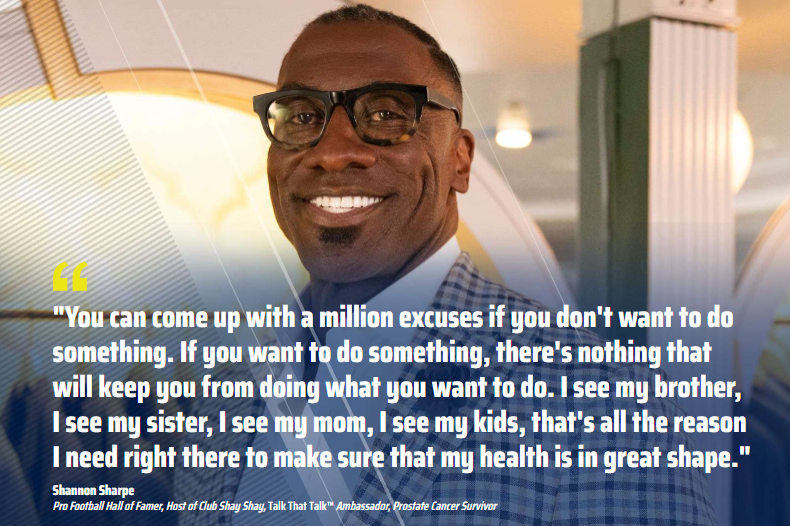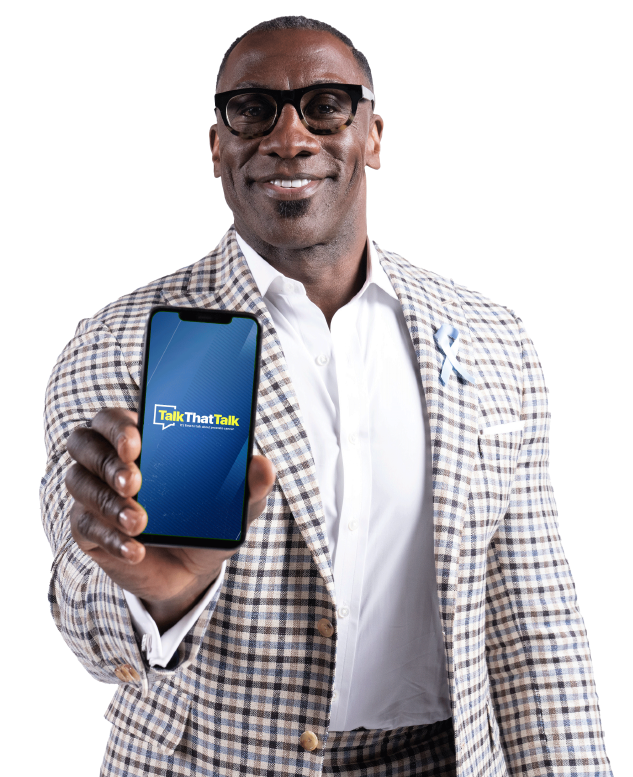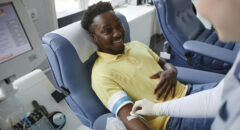cp-470122v1

Sponsored by Johnson & Johnson
Shannon Sharpe and Dr. Russell J. Ledet have been compensated by Johnson & Johnson to share their story.
Shannon Sharpe, a professional football Hall of Famer, has personally faced the tragic toll of cancer’s disproportionate impact on Black communities. His father passed away at the young age of 39 from cancer and several of his uncles died from the disease in their 40s and 50s. Prostate cancer, in particular, has a significant impact on Black men. One in six Black men will be diagnosed with prostate cancer in their lifetime1 and are twice as likely to die from prostate cancer than most other men.1-3 Being aware of his family’s history of cancer prompted Shannon to start screening at the age of 35, but he was still shocked when he was diagnosed with prostate cancer in 2016.
“I was confused when I heard the news because here I was…a health conscious man who trained regularly and ate well, yet I was still diagnosed with this disease at an early age in my late 40s. Thankfully, knowing about my family health history and taking action saved my life. That’s why I’m so passionate about using my platform to encourage other Black men to have candid conversations with each other about screening. Young men especially can play a role in prompting conversations with older relatives,” he shares.
Lowering the recommended age for prostate-specific antigen (PSA) testing for Black men could reduce prostate cancer deaths among this population by about 30%.4-6 Some people may not be aware that the first step in prostate screening is a PSA test. A PSA test is a simple blood test that measures the amount of prostate-specific antigens, a protein produced by the prostate gland, in a man’s blood. High levels of PSA may indicate prostate cancer or other prostate issues.7 There’s an up to 96% survival rate if prostate cancer is caught early enough.1,2,8 The American Cancer Society recommended lowering the age for annual PSA testing among Black men from ages 50-55 to ages 40-45.4,5 This is a meaningful step to help turn the tide and make a difference in Black men’s lives.
Today, Shannon is cancer-free and has partnered with Johnson & Johnson on the Talk That Talk® initiative. This campaign encourages informed and honest conversations around prostate cancer among Black men and shares culturally relevant resources to help guide these dialogues.

Navigating the Conversation: Tips and Resources
Many Black communities remain hesitant about receiving medical care due to historical health care discrimination and inequality, which can discourage people from having vulnerable conversations and seeking support.1 Moreover, given that a cancer diagnosis can have such a profound impact on people, some choose to keep it private. Other than telling a small group of family and friends, Shannon battled prostate cancer privately until 2022, when he started to open up to more people in his life before ultimately deciding it could be helpful for others to learn about— and from— his experience and the importance of knowing your risk. He knew he could use his platform to reach Black men and encourage them to start having conversations about their health.
“Talking about prostate cancer is tough, no matter who you are, but especially for Black men. At the same time, it’s crucial for the well-being of our community. We are counting on our elder Kings to guide us, and that means we must have tough conversations. As a physician who’s seen firsthand how important early detection is, I know these conversations can save lives. Growing up in a time when the pandemic has pushed us all to be more health conscious and prioritize self-care, young Black men have a unique opportunity—and responsibility—to lead these discussions. Especially with our older male relatives, who might see this as a taboo topic,” says Dr. Russell J. Ledet, Triple Board Resident at Indiana University Health. “Our elders may shy away from these talks because they want to appear strong and not show vulnerability. But as millennials, Gen Z, and Gen X, we often have better access to health information and are more comfortable with technology. We need to use that knowledge and take the lead in starting these important conversations.”
If you are a young man who wants to learn about your family’s health history and help older relatives learn more about prostate cancer, here are some tips and resources for initiating and navigating these discussions:
1. Educate Yourself First:
Before starting the conversation, get familiar with prostate cancer, including symptoms, treatment options, and recommendations about screening for prostate cancer. Being equipped with this information will empower you to have more informed conversations with loved ones. Download relevant resources from patient advocacy organizations and reputable sources, including Talk That Talk®, an awareness program with Shannon Sharpe.
2. Choose the Right Time and Place:
Find a comfortable and private setting to have the discussion. Avoid times of high stress or distraction to ensure the conversation is productive.
3. Lead with Genuine Curiosity and Concern:
Approach the conversation with empathy, understanding it may require vulnerability on both of your parts. Let them know you appreciate them being open with you. Share that you want to be proactive about your health and that you want to help them stay healthy too.
Below are some sample lines to initiate the conversation:
- “I recently read about Shannon Sharpe’s battle with prostate cancer. It can start at a younger age among Black men than others. Can I tell you more?”
- “Did you know that generally one of the steps in screening for prostate cancer is a blood test after having an informed discussion with your doctor?”
- “I just learned that it is now recommended that Black men can speak to their doctor about PSA testing as early as age 40.5 Did you know about this?”
- “Based on what I’m reading, I should learn more about Black men’s high risk of developing prostate cancer.2 May we talk about this?”
- “I care about our family’s well-being and want to understand our family’s health history and risk of developing prostate cancer. Let’s talk about that.”
Sharing stories of people who have benefited from early detection can be an easy way to open the door to talk about hard topics. Shannon’s story is a powerful example of how early testing can save lives.

At the Doctor’s Office
When you or your loved ones are preparing to talk to a doctor about prostate cancer risks, the Talk That Talk® website has appointment checklists and discussion guides to help prepare for the conversation. Using these tools can help a person speak openly, which can lay the foundation for a trusting relationship with their doctor.
“Whenever I went in for a checkup, I talked to my doctor about common interests, like football, the dogs, our kids— it was a two-way conversation. This helped us build a strong connection beyond just focusing on my health. As a result, having a close relationship with him kept me informed and fully engaged during my care journey,” says Shannon.
Doctors can better create a personalized care plan that tackles their patient’s unique needs head-on when people openly share their health concerns and questions. “My top priority is creating a safe and brave space where my patients feel comfortable opening up about their worries and needs. I always tell my patients, ‘It’s more than OK to cry, shout, and feel all the feels.’ We’re a team, and the goal is to win at health care. A cancer diagnosis can shake you to your core—it’s deeply personal. When one of my patients gets that diagnosis, I’m right there with them, making sure they feel empowered to take an active role in their care,” says Dr. Ledet. “Every patient deserves that level of support—so don’t be afraid to speak up. Trust me, your doctor has seen it all, and we’re here to have your back.”
Have the Conversation Today
By normalizing these crucial conversations and raising awareness about prostate cancer, young men can play a role in helping reduce the impact of this disease in their Black community. Download and share Talk That Talk® and other resources and have those important health conversations today.
References
- American Cancer Society. Cancer Facts & Figures for African American/Black People 2022-2024. Accessed August 8, 2024. https://www.cancer.org/content/dam/cancer-org/research/cancer-facts-and-statistics/cancer-facts-and-figures-for-african-americans/2022-2024-cff-aa.pdf
- National Cancer Institute. Prostate Cancer – Cancer Stat Facts. Surveillance, epidemiology, and end results program. Accessed August 8, 2024. https://seer.cancer.gov/statistics
- Miller EA, Pinsky PF, et al. Secondary prostate cancer screening outcomes by race in the Prostate, Lung, Colorectal, and Ovarian (PLCO) Screening Trial. The Prostate. 2018;1-9. https://doi.org/10.1002/pros.23540
- Garraway IP, Carlsson SV, Nyame YA, et al. Prostate Cancer Foundation Screening Guidelines for Black Men in the United States. NEJM Evid. 2024;3(5):EVIDoa2300289. doi:10.1056/EVIDoa230028
- American Cancer Society. American Cancer Society Recommendations for Prostate Cancer Early Detection. Accessed August 8, 2024. https://www.cancer.org/cancer/types/prostate-cancer/detection-diagnosis-staging/acs-recommendations.html
- Nyame YA, Gulati R, Heijnsdijk EAM, et al. The impact of intensify- ing prostate cancer screening in Black men: a model-based analysis. J Natl Cancer Inst. 2021;113:1336-1342. DOI: 10.1093/jnci/djab072.
- National Cancer Institute. Prostate-Specific Antigen (PSA) Test. Accessed August 8, 2024. https://www.cancer.org/cancer/types/prostate-cancer/detection-diagnosis-staging/acs-recommendations.html
- American Cancer Society. Prostate Cancer Early Detection, Diagnosis and Staging. Accessed October 4, 2024. https://www.cancer.org/cancer/types/prostate-cancer/detection-diagnosis-staging.html
© Janssen Biotech, Inc. 2024 11/24 cp-470122v1








